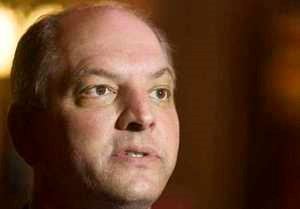By Letitia Stein
BATON ROUGE, La. (Reuters) - Louisiana's Democratic candidate for governor was shaking the hands of military veterans at the Old State Capitol when a woman approached with a confession: She's a Republican, but she was voting for him anyway.
"I hear that all the time," said John Bel Edwards, a state legislator whose strength in an off-year election has Democrats salivating over an unexpected chance to seize the top office in a conservative state.
Edwards, an anti-abortion, pro-gun rights fiscal moderate, heads into Saturday's runoff election with a substantial lead in the polls over his Republican opponent, U.S. Senator David Vitter, in a race showcasing Louisiana's famed bare-knuckles politics.
While no one had predicted this close of a contest to replace outgoing Republican Governor Bobby Jindal, Edwards' momentum is not seen as a Democratic sea change in state politics.
But with Vitter haunted by memories of a prostitution scandal, Democrats could budge the political needle in the U.S. South, where the party is now locked out of every governor's mansion south of Virginia.
The nonpartisan Cook Political Report changed its rating in the race last week to leaning Democratic given Vitter's slide.
"People have found in David Vitter the one guy that a Democrat can beat," said Robert Mann, a Louisiana State University communications professor who formerly worked for leading state Democrats.
Vitter entered the race as the front-runner to replace Jindal, who on Tuesday suspended his bid for the Republican presidential nomination after being barred by term limits from seeking re-election as governor. With Republicans controlling all statewide offices and the legislature, the runoff was expected to be a formality.
But Vitter took a beating last month in an open primary with three credible Republicans and Edwards on the same ballot. The mudslinging resurrected Vitter's entanglement in the 2007 "D.C. Madam" prostitution scandal.
In southern Louisiana's Bayou Country, hair stylist Lindsey Champagne was uncertain about supporting a Democrat, fearing higher taxes. But the 32-year-old, who is not affiliated with a political party, said she was repulsed by Vitter.
"Hell no," she said. "I would not vote for Vitter if there was a gun to my head."
'PROSTITUTES OVER PATRIOTS'
Edwards, 49, has a resume that once easily got Democrats elected in Louisiana.
A former Army Ranger and graduate of the U.S. Military Academy at West Point, he touts strong ratings from the National Rife Association and the anti-abortion Louisiana Right to Life Federation.
On fiscal issues, he calls himself moderate. Edwards would favor expanding Medicaid coverage for the poor under President Barack Obama's health care law.
After the primary revealed potential for an upset, Edwards' campaign has garnered nearly $2 million in support from the Democratic Governors Association, and he picked up the endorsement of one of the jilted Republican contenders.
His pitch to voters focuses on not being Vitter.
Edwards launched an ad about the 2007 prostitution scandal that accuses Vitter of missing a congressional vote to honor fallen soldiers minutes before taking a phone call from the prostitution agency.
The tagline: "David Vitter chose prostitutes over patriots."
Yet vice was not a deal-breaker when Louisiana voters re-elected Vitter to the Senate after the scandal broke. He then acknowledged simply a "serious sin."
This election, the married senator has his own ad telling voters that he failed his family years ago "but found forgiveness and love."
He accuses Edwards of distracting from issues, and he thinks the Democrat is not in tune with the state's voters.
"Louisiana is a conservative place. He is far left of the mainstream," Vitter said during an interview after a campaign event in Houma, Louisiana.
The national Republican Governors Association has been running ads linking Edwards to the agenda of the Democratic president, who is unpopular in the state.
Vitter also has turned the Paris attacks into a point of contention, with a campaign ad accusing Edwards of supporting Obama's plan to relocate refugees from war-torn Syria to Louisiana. Edwards called the jabs desperate and said he wanted to stop the entry of refugees into Louisiana.
Voter turnout could be key. Democrats traditionally need a strong showing among black voters, who heavily favor the party, along with about a third the state's white voters, said Edward Chervenak, a University of New Orleans political scientist.
Stephanie Hebert, 57, a Republican insurance company owner in Houma, thought about sitting out the runoff but will support Vitter.

"At the end, I hope and I believe David will pull it off, simply because Republicans won't cross party lines," she said.